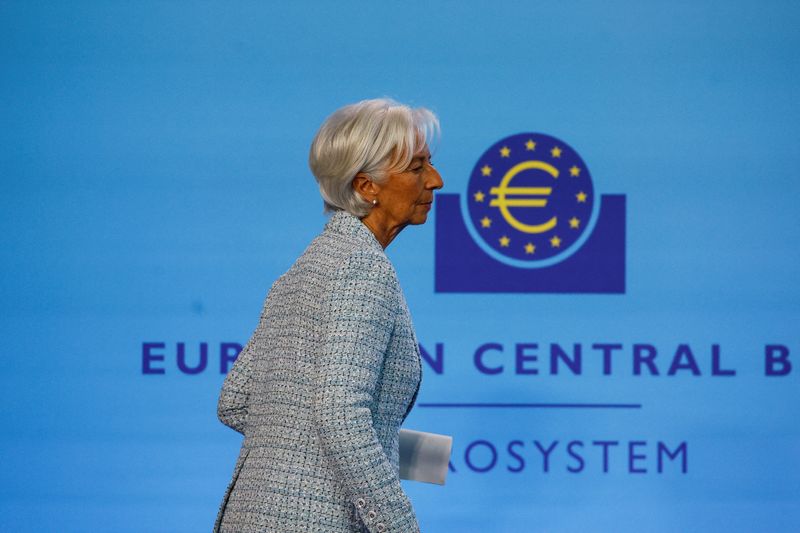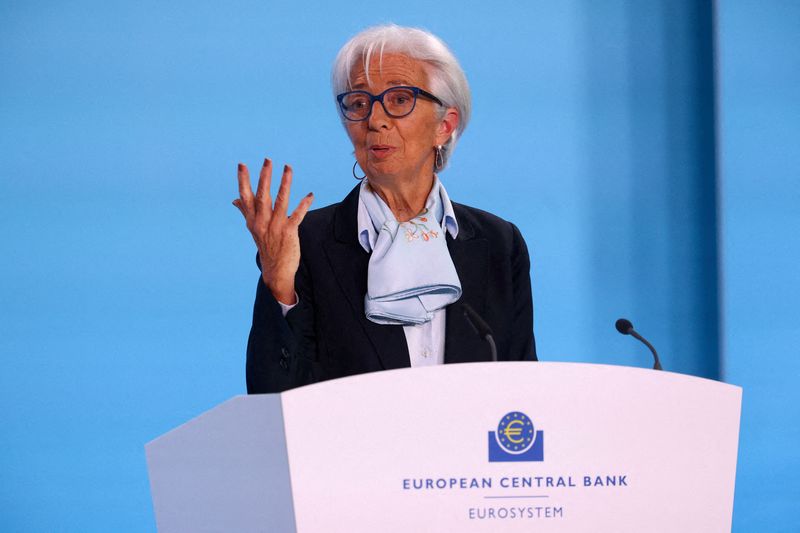By Francesco Canepa and Balazs Koranyi
FRANKFURT (Reuters) -The European Central Bank went ahead with its first interest rate cut since 2019 on Thursday, keeping its word despite an increasingly uncertain inflation outlook.
The ECB had all but promised a rate cut after seeing inflation fall from 10% in 2022 to just over its 2% target recently, mostly courtesy of lower fuel costs and normalised supply chains after some post-pandemic snags.
However, that progress has stalled recently and the latest wage and price data have been stronger than expected, raising fears that inflation may prove sticky, as it has in the United States.
ECB policymakers at Thursday's meeting were even presented with increased staff forecasts for inflation, which is now expected to stay above its 2% target until late next year.
Still, the ECB delivered the promised rate cut, partly to keep a pledge that so many policymakers had made in public, sources told Reuters.
"Despite the progress over recent quarters, domestic price pressures remain strong as wage growth is elevated, and inflation is likely to stay above target well into next year," the ECB said as it announced the decision.
The message confused some observers and weakened investor confidence about further rate cuts, with only one more move fully priced in by the end of this year.
"One wonders whether the ECB got stuck when prematurely announcing a cut, ahead of inflation and wage data," Christophe Boucher, chief investment officer at ABN AMRO (AS:ABNd) Investment Solutions, said.
The decision was nearly unanimous, with only Austria's central bank governor Robert Holzmann objecting to it.
Yet a few conservative policymakers expressed regret about committing to a rate cut and some even said they might have otherwise voted for holding rates, sources said.
BALANCING ACT
ECB President Christine Lagarde attempted a difficult balancing act at her news conference when she was asked if the central bank would continue to dial back its steepest ever streak of rate hikes.
"Are we today moving into a dialling back phase? I wouldn't volunteer that," she said. "Is the dialling back process underway? There's a strong likelihood."
Arne Petimezas, an analyst at Dutch broker AFS, described her message as confusing.
"I still don’t know if she wanted to suggest that the likelihood of additional cuts is low or high or that the ECB will be on hold for a long time," he wrote in a note.
Sources told Reuters after the meeting that they saw a rate cut in July as unlikely, with the focus now on September, when the ECB will once again update its macroeconomic projections.
"We are not pre-comitting to a particular rate path," Lagarde said.
With Thursday's move the ECB lowered the rate it pays on bank deposits to 3.75% from a record 4.0%. It joins the central banks of Canada, Sweden and Switzerland in undoing some of the steepest streaks of interest rate hikes in recent history.

The U.S. Federal Reserve has been stopped in its tracks by some stronger-than-expected inflation readings and is not expected to move until after the summer at the earliest.
"The rate trajectory of the ECB will depend on the evolution of data from here on and the Fed, which we think will be unable to cut this year given the stickiness in U.S. inflation," Salman Ahmed, global head of macro and strategic asset allocation at Fidelity International, said.
